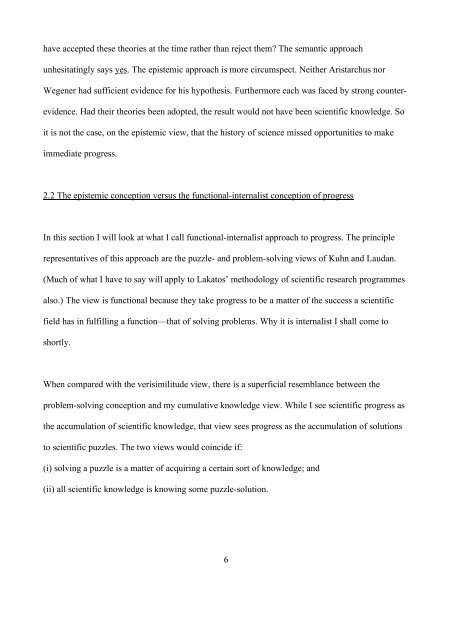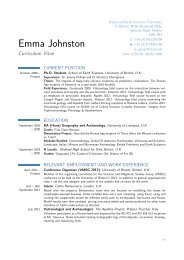What is Scientific Progress?
What is Scientific Progress?
What is Scientific Progress?
You also want an ePaper? Increase the reach of your titles
YUMPU automatically turns print PDFs into web optimized ePapers that Google loves.
have accepted these theories at the time rather than reject them? The semantic approach<br />
unhesitatingly says yes. The ep<strong>is</strong>temic approach <strong>is</strong> more circumspect. Neither Ar<strong>is</strong>tarchus nor<br />
Wegener had sufficient evidence for h<strong>is</strong> hypothes<strong>is</strong>. Furthermore each was faced by strong counter-<br />
evidence. Had their theories been adopted, the result would not have been scientific knowledge. So<br />
it <strong>is</strong> not the case, on the ep<strong>is</strong>temic view, that the h<strong>is</strong>tory of science m<strong>is</strong>sed opportunities to make<br />
immediate progress.<br />
2.2 The ep<strong>is</strong>temic conception versus the functional-internal<strong>is</strong>t conception of progress<br />
In th<strong>is</strong> section I will look at what I call functional-internal<strong>is</strong>t approach to progress. The principle<br />
representatives of th<strong>is</strong> approach are the puzzle- and problem-solving views of Kuhn and Laudan.<br />
(Much of what I have to say will apply to Lakatos’ methodology of scientific research programmes<br />
also.) The view <strong>is</strong> functional because they take progress to be a matter of the success a scientific<br />
field has in fulfilling a function—that of solving problems. Why it <strong>is</strong> internal<strong>is</strong>t I shall come to<br />
shortly.<br />
When compared with the ver<strong>is</strong>imilitude view, there <strong>is</strong> a superficial resemblance between the<br />
problem-solving conception and my cumulative knowledge view. While I see scientific progress as<br />
the accumulation of scientific knowledge, that view sees progress as the accumulation of solutions<br />
to scientific puzzles. The two views would coincide if:<br />
(i) solving a puzzle <strong>is</strong> a matter of acquiring a certain sort of knowledge; and<br />
(ii) all scientific knowledge <strong>is</strong> knowing some puzzle-solution.<br />
6






